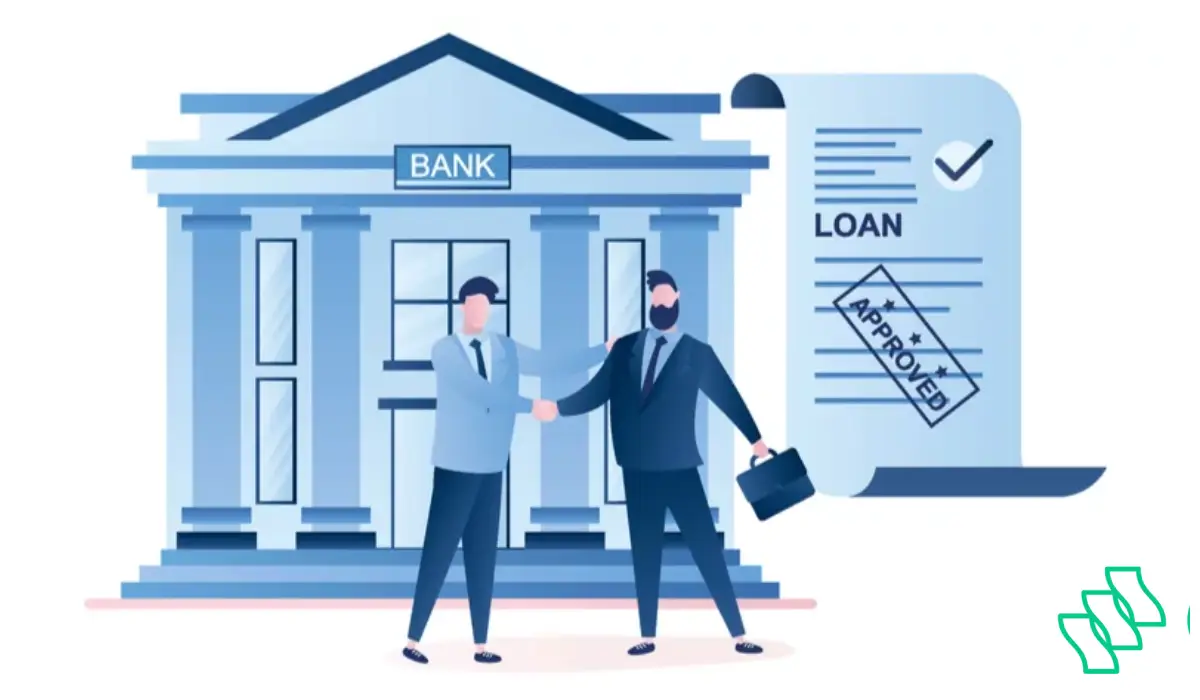Starting or expanding a business often requires significant funding. Whether you’re opening a new store, purchasing equipment, or simply covering operating expenses, a small business loan amount can help you manage the costs. However, securing a $100k business loan can feel intimidating, especially if you’re unsure of where to start. In this guide, we’ll walk you through the process of securing a large business’ $100k business loan amount and what you need to consider along the way.
What Is a Business Loan?
A business loan is money that a lender provides to a business to help cover various expenses. Businesses can borrow money for various needs, such as buying equipment, hiring employees, or expanding their business lines of operations. In exchange, the business agrees to pay back the loan, usually with interest, over a set period of time.

- Amount = $5,000 to $500,000
- Loan Term = 4 to 24 months
- Interest Rate = 1.11%
4.8
editorial team. We score based on factors
that are helpful for consumers, such as
how it affects credit scores, the rates and
fees charged, the customer experience,
and responsible lending practices.
- Min. Amount = $10,000
- Max Amount = $500,000
- APR = Factor rate starting at 1.11%
4.8
editorial team. We score based on factors
that are helpful for consumers, such as
how it affects credit scores, the rates and
fees charged, the customer experience,
and responsible lending practices.
Best for large business loans

- Loan Amount = $25,000 - $3,000,000
- $10,000 in Monthly Rev
- No minimum credit score requirement
4.9
editorial team. We score based on factors
that are helpful for consumers, such as
how it affects credit scores, the rates and
fees charged, the customer experience,
and responsible lending practices.
Best for large business loans

- Min Amount = $5,000 - 1,500,000
- APR range Not disclosed
- Minimum Credit Score 570
4.7
editorial team. We score based on factors
that are helpful for consumers, such as
how it affects credit scores, the rates and
fees charged, the customer experience,
and responsible lending practices.
Best for Small business loans

- Min Credit Score = 620
- Loan Amount = $10K-$5M
- Term = 6 months - 10 years
- APR = Variable
4.8
editorial team. We score based on factors
that are helpful for consumers, such as
how it affects credit scores, the rates and
fees charged, the customer experience,
and responsible lending practices.

- Check Your Eligibility
- Get $10K to $2M
- 24/7 Support
4.8
editorial team. We score based on factors
that are helpful for consumers, such as
how it affects credit scores, the rates and
fees charged, the customer experience,
and responsible lending practices.

- Amount = $10,000 to $1,000,000
- Factor Rate = Starting at 1.24
- Term = 2 to 12 months
4.7
editorial team. We score based on factors
that are helpful for consumers, such as
how it affects credit scores, the rates and
fees charged, the customer experience,
and responsible lending practices.

Types of Business Loans
When looking for a $100k business loan, it’s important to know that there are different types of first business loans available. Each startup business loan has its own benefits and drawbacks, and not all of them will be the right fit for your business.
1. SBA Loans
The U.S. Small Business Administration (SBA) offers various loan programs designed to help small businesses get funding. SBA loans are partially guaranteed by the government, making them less risky for lenders. This means they can offer better terms to borrowers, like lower interest rates and longer repayment periods.
- Pros:
- Low interest rates
- Long repayment terms
- Easier approval for small businesses
- Cons:
- Lengthy application process
- Strict qualification requirements
2. Business Term Loans
A business term loan or traditional lender provides a lump sum of cash upfront, a loan amount which you agree to pay back over a set period with interest. These term loans or traditional lenders are typically best for businesses that need a significant amount of capital for a specific purpose, such as opening a new location or purchasing expensive equipment.
- Pros:
- Fixed repayment schedule
- Can be used for various business purposes
- Cons:
- Higher interest rates for businesses with lower credit scores
- Requires a strong financial history to qualify
3. Commercial Real Estate Loans
If you plan to purchase, build, or renovate commercial property national business capital, a commercial real estate loan may be the right choice. These loans are used specifically for national business capital to finance properties for national business capital use, such as office buildings, retail spaces, or warehouses.
- Pros:
- Large loan amounts available
- Competitive interest rates for qualified borrowers
- Cons:
- Collateral required (the property itself)
- The approval process can be lengthy
4. Equipment Financing Loans
If your small business owner needs to purchase expensive equipment, equipment financing is a smart option. With this type of loan, the equipment itself serves as collateral, which can the down payment and make it easier for alternative business loans to qualify. Once you’ve paid off the loan, you fully own the equipment.
- Pros:
- Easier approval process
- No need for additional collateral
- Cons:
- Equipment can become outdated before the loan is paid off
- Equipment may lose value over time
5. Secured Business Loans
A secured business loan requires you to put up assets as collateral, such as real estate, equipment, or inventory. In return, best small business loan, lenders who require collateral will often provide lower interest rates because they have more security if you’re unable to repay the loan.
- Pros:
- Lower interest rates
- It is easier to qualify for larger loan amounts
- Cons:
- Risk of losing collateral if you default on the loan
- May require significant assets to secure a loan

How to Get a $100k Business Loan
Now that you’re familiar with the different types of bank and business loans, let’s dive into how to get a $100k business loan. Here are the steps you should take to increase your business financing chances of approval:
1. Determine How Much You Need
Before applying for a loan, figure out how much money your business really needs. While it might be tempting to ask for the maximum amount, it’s important to borrow only what you can afford to pay back. Lenders will also want to know exactly how you plan to use the money, so having a detailed plan will work in your favour.
2. Check Your Credit Score
Your credit score plays a big role in whether or not you’ll qualify for a business loan, as well as the interest rate you’ll receive. Lenders use your credit score to assess your financial responsibility. If your score is too low, you may not get approved, or you may receive a loan with higher interest rates. Generally, a score above 680 is considered good for a business credit scores most lenders.
To check your credit score:
- Use free online tools or services.
- Review your credit report for any errors that could negatively impact your score.
- If needed, take steps to improve your score, such as paying off outstanding debts.
3. Gather Necessary Documents
Once you’ve checked your personal credit score and determined your funding needs, it’s time to gather the required legal documents together. Lenders will ask for various information to evaluate your application, including:
- Business Plan: This document should outline your business goals, strategies, and how you plan to use the loan funds. A solid business plan demonstrates to lenders that you are serious about your business and have a clear path to success.
- Financial Statements: Prepare recent financial statements, such as balance sheets, income statements, and cash flow statements. These documents give lenders insight into your business’s financial health.
- Tax Returns: Most lenders will want to see your business tax returns from the past two to three years. This helps them assess your revenue and overall financial performance.
- Personal Financial Information: If your business is new or if you’re a sole proprietor, lenders may also want to see your personal credit history and financial information.
4. Research Lenders
Not all online lenders tend to offer the same loan terms, so it’s crucial to shop around. Research various options, including:
- Banks and Credit Unions: Traditional banks often offer competitive rates but may have strict lending criteria. Credit unions might have more lenient terms, so they’re worth exploring.
- Online Lenders: Many online platforms provide business loans and may have quicker approval processes. However, they might charge higher interest rates, so compare terms carefully.
- Peer-to-Peer Lenders: These platforms connect borrowers directly with investors. They can be an alternative option if traditional lenders decline your application.
5. Prepare Your Loan Application
When you’re ready to apply, carefully complete the loan application. Provide all requested information and double-check for accuracy. Incomplete or incorrect applications can delay the process or lead to denial.
Include a cover letter summarizing your loan request and highlighting your business’s strengths. Personalizing your application can help you stand out to lenders.
6. Submit the Application
Once you’ve finalized your application, submit it along with all required documents. Many lenders allow you to apply online, which can speed up the process. Be prepared for follow-up questions or additional documentation requests from the lender.
7. Review Loan Offers
After submitting your application, you might receive offers from various lenders. Take the time to carefully review each one, comparing interest rates, repayment terms, and any additional fees.
Look for the following when comparing offers:
- Interest Rates: Lower rates save you money over the life of the loan.
- Repayment Terms: Longer terms mean smaller monthly payments, but you may pay more in interest over time.
- Fees: Some loans have origination fees, prepayment penalties, or other costs that can add up.
8. Negotiate Terms
Don’t be afraid to negotiate the terms of your loan. If you receive multiple offers, you can use them to leverage better rates or terms. Remember, lenders want your business, so they may be willing to adjust their offers to secure you as a customer.
Once you’ve chosen the best loan offer, read the terms carefully before signing. Ensure you understand the repayment schedule and any penalties for late payments.
After securing the loan, use the funds for your first business credit line for their intended purpose. Stick to your first business line and plan to the bank loan to help ensure your investment leads your business line to growth and profitability.


- Amount = $5,000 to $500,000
- Loan Term = 4 to 24 months
- Interest Rate = 1.11%
4.8
editorial team. We score based on factors
that are helpful for consumers, such as
how it affects credit scores, the rates and
fees charged, the customer experience,
and responsible lending practices.
- Min. Amount = $10,000
- Max Amount = $500,000
- APR = Factor rate starting at 1.11%
4.8
editorial team. We score based on factors
that are helpful for consumers, such as
how it affects credit scores, the rates and
fees charged, the customer experience,
and responsible lending practices.
Best for large business loans

- Loan Amount = $25,000 - $3,000,000
- $10,000 in Monthly Rev
- No minimum credit score requirement
4.9
editorial team. We score based on factors
that are helpful for consumers, such as
how it affects credit scores, the rates and
fees charged, the customer experience,
and responsible lending practices.
Best for large business loans

- Min Amount = $5,000 - 1,500,000
- APR range Not disclosed
- Minimum Credit Score 570
4.7
editorial team. We score based on factors
that are helpful for consumers, such as
how it affects credit scores, the rates and
fees charged, the customer experience,
and responsible lending practices.
Best for Small business loans

- Min Credit Score = 620
- Loan Amount = $10K-$5M
- Term = 6 months - 10 years
- APR = Variable
4.8
editorial team. We score based on factors
that are helpful for consumers, such as
how it affects credit scores, the rates and
fees charged, the customer experience,
and responsible lending practices.

- Check Your Eligibility
- Get $10K to $2M
- 24/7 Support
4.8
editorial team. We score based on factors
that are helpful for consumers, such as
how it affects credit scores, the rates and
fees charged, the customer experience,
and responsible lending practices.

- Amount = $10,000 to $1,000,000
- Factor Rate = Starting at 1.24
- Term = 2 to 12 months
4.7
editorial team. We score based on factors
that are helpful for consumers, such as
how it affects credit scores, the rates and
fees charged, the customer experience,
and responsible lending practices.
Tips for Getting Approved
- Build a Strong Business Credit History: Establishing a good credit history for your business can make it easier to get loans in the future. Pay bills on time and keep your debt levels manageable.
- Maintain Good Financial Records: Keep detailed and accurate financial records. This demonstrates your business’s health to potential lenders.
- Prepare for the Unexpected: Be ready for unexpected expenses or changes in your financial situation. Lenders may ask how you plan to handle potential challenges, so have backup plans in place.
- Consider a Co-signer: If your credit isn’t great, a co-signer with a strong credit history may improve your chances of getting approved.
Getting a $100k business loan can be a game-changer for your business. By understanding the types of small business loans that are available, preparing thoroughly, and following the steps outlined in this guide, you can increase your chances of securing the funding you need. Remember, borrowing money is a big commitment, so take the time to research and choose the right loan for your business’s needs. With careful planning and smart financial decisions, you can set your business up for success.

Additional Factors to Consider When Applying for a Business Loan
When applying for get a 100k+ business loan or $100k business loan, there are several additional factors you should keep in mind to strengthen your application, good business, high credit score and ensure that you make your business bank account a sound financial decision.
1. Your Business’s Age and Stability
Lenders often look at how long your business has been operating when assessing business loan applications too. Established businesses with a track record of success are more likely to receive favorable loan terms compared to newer businesses. If you’re a startup, be prepared to provide evidence of your business plan, projected earnings, and any relevant experience you or your team members have in the industry.
2. Industry Risk
Different industries carry different levels of risk, and lenders may take this into account when reviewing your loan application. If you’re in a high-risk industry, like retail or hospitality, lenders may view your application with more scrutiny. Research and be prepared to explain how your business plans to mitigate risks associated with your industry.
3. Cash Flow Management
Cash flow is crucial for the health of any business. Lenders will closely examine your cash flow statements to ensure you have enough income to cover loan repayments. A strong cash flow position shows lenders that your business can handle the additional financial burden of a loan. Be ready to provide documentation that demonstrates consistent cash inflows and sound financial management practices.
4. Debt-to-Income Ratio
Your debt-to-income (DTI) ratio is another important factor that lenders consider. This ratio compares your monthly debt payments to your monthly income. A lower DTI indicates that you have enough income to manage your debts, making you a more attractive borrower. As a general rule, a DTI of 36% or lower is preferred by most lenders.

Preparing for the Interview
If you reach the stage where a lender wants to meet with you (whether virtually or in person), preparation is key. Here are some tips to ensure you make a positive impression:
1. Know Your Numbers
Be ready to discuss your business’s financials in detail. Familiarize yourself with your balance sheets, profit and loss statements, and cash flow projections. Being knowledgeable about your numbers will boost your confidence and demonstrate to lenders that you understand your business.
2. Practice Your Pitch
Prepare a clear and concise pitch for your small business loans. Focus on why you need the a business loan, how you plan to use it, and how it will benefit your business. Highlight your business’s strengths, such as customer loyalty, market share, or unique offerings.
3. Anticipate Questions
Think about potential questions a lender might ask, and prepare thoughtful responses. Common inquiries may include:
- What challenges has your business faced?
- How will you handle unexpected expenses?
- What are your long-term goals for the business?
4. Dress Professionally
If you’re meeting in person, make sure to dress appropriately. Professional attire shows that you take the loan process seriously and respect the lender’s time.
Common Mistakes to Avoid When Applying for a Loan
To increase minimum credit score requirements and your minimum personal credit score and chances of approval, be aware of common mistakes that borrowers make:
1. Being Unprepared
One of the biggest pitfalls is not being adequately prepared for the loan application process. Make sure you have all necessary financial and legal documents all ready before applying, and be clear about how much money you need and why.
2. Not Understanding Loan Terms
Before signing any loan agreement, thoroughly read and understand the terms. This includes interest rates, repayment schedules, and any penalties for late payments or early repayment. Don’t hesitate to ask the lender for clarification if something is unclear.
3. Ignoring Your Credit Report
Focusing solely on your credit score without reviewing your entire business credit report can lead to issues. Sometimes, errors or discrepancies in business credit score can affect your personal credit score too. Ensure you check for inaccuracies or bad business credit cards first, and dispute them if necessary before applying for a loan.
4. Not Shopping Around
Failing to compare loan offers from other alternative lenders or online lenders can lead to missing out on better terms and pay interest only. Always shop around and get quotes from multiple alternative lenders, to find the best deal.
Post-Loan Management
Once you’ve secured your $100k business loan, it’s vital to manage it wisely to ensure the success of your small business term loans and keep your financial health in check. Here are some tips for effective post-loan management:
1. Create a Budget
Establish a budget that outlines how you plan to use the loan funds. This helps ensure that you allocate resources effectively and avoid overspending.
2. Monitor Your Cash Flow
Keep a close eye on your cash flow to ensure you have enough money to cover your loan payments and other business expenses. Implement tools or software that can help track your income and expenses effectively.
3. Plan for Repayment
Prepare for your loan repayments by setting aside a portion of your revenue each month. This proactive approach to fixed monthly payments can help you avoid late payments and any associated penalties.
4. Seek Professional Advice
Consider consulting with a financial advisor or accountant who can take personal loans and provide expert guidance on managing your finances and making the most of your loan.

Building Relationships with Lenders
Building a good relationship with your lender can be beneficial for your business in the long run. Here are ways to foster a positive relationship:
1. Communicate Openly
Keep lines of communication open with your lender. If you encounter any financial challenges or need to adjust your repayment schedule, let them know as soon as possible. Most lenders appreciate proactive communication.
2. Share Your Successes
Regularly update your lender on your business progress and achievements. This can help strengthen your relationship and show your lender that you are a responsible borrower.
3. Consider Future Borrowing Needs
If you plan to borrow more in the future, establishing a positive relationship with your lender can lead to better terms and quicker approvals alternative small business loans down the road.

FAQs About $100k Business Loans
How hard is it to get a $ to get a 100k business $,000 business loan?100k business loan?
Getting a $100k business loan can be challenging, especially for startups or businesses with limited business credit cards or history. Lenders look for strong financials, a solid business plan, and good enough business credit cards and credit scores beforehand. The more prepared and organized you are, the easier the process will be. It’s crucial to present your business in the best light, highlighting your strengths and addressing any weaknesses.
How much is the monthly payment for a $100k business loan?
The monthly payment on a $100k business loan depends on several factors, including the loan term and interest rate. For example, if you have a 7% interest rate on a 10-year $ 100,000 business loan, your monthly payment would be approximately $1,161. You can use online business loan calculator calculators to estimate your monthly payments based on different rates and terms of business financing.
How hard is it to get a $100k loan?
Securing a $100k or 100,000 business loan can be challenging, particularly for new businesses or those with poor credit. Lenders often require detailed documentation building business credit, and a solid business plan. The key to success building good business credit score is preparation: understand your financials, improve your credit score, and have a clear purpose for the loan.

How to get $100,000 to start a business?
To get $100,000 to start a business, you can explore several options:
- Traditional Loans: Apply for a bank or credit union loan.
- SBA Loans: Consider loans backed by the Small Business Administration.
- Investors: Seek out venture capitalists or angel investors willing to invest in your business.
- Crowdfunding: Use crowdfunding platforms to raise money from a large number of people.
- Grants: Research grants that may be available for your type of business.

- Amount = $5,000 to $500,000
- Loan Term = 4 to 24 months
- Interest Rate = 1.11%
4.8
editorial team. We score based on factors
that are helpful for consumers, such as
how it affects credit scores, the rates and
fees charged, the customer experience,
and responsible lending practices.
- Min. Amount = $10,000
- Max Amount = $500,000
- APR = Factor rate starting at 1.11%
4.8
editorial team. We score based on factors
that are helpful for consumers, such as
how it affects credit scores, the rates and
fees charged, the customer experience,
and responsible lending practices.
Best for large business loans

- Loan Amount = $25,000 - $3,000,000
- $10,000 in Monthly Rev
- No minimum credit score requirement
4.9
editorial team. We score based on factors
that are helpful for consumers, such as
how it affects credit scores, the rates and
fees charged, the customer experience,
and responsible lending practices.
Best for large business loans

- Min Amount = $5,000 - 1,500,000
- APR range Not disclosed
- Minimum Credit Score 570
4.7
editorial team. We score based on factors
that are helpful for consumers, such as
how it affects credit scores, the rates and
fees charged, the customer experience,
and responsible lending practices.
Best for Small business loans

- Min Credit Score = 620
- Loan Amount = $10K-$5M
- Term = 6 months - 10 years
- APR = Variable
4.8
editorial team. We score based on factors
that are helpful for consumers, such as
how it affects credit scores, the rates and
fees charged, the customer experience,
and responsible lending practices.

- Check Your Eligibility
- Get $10K to $2M
- 24/7 Support
4.8
editorial team. We score based on factors
that are helpful for consumers, such as
how it affects credit scores, the rates and
fees charged, the customer experience,
and responsible lending practices.

- Amount = $10,000 to $1,000,000
- Factor Rate = Starting at 1.24
- Term = 2 to 12 months
4.7
editorial team. We score based on factors
that are helpful for consumers, such as
how it affects credit scores, the rates and
fees charged, the customer experience,
and responsible lending practices.


 Read More
Read More 





3 Responses